How to get rid of stinging nettles
Some gardeners especially those growing fruit and vegetables or in a garden where kids are playing may wish to eliminate Stinging Nettles altogether. Others just keep them in check. So further on in this article let's look at a few positive facts about nettles
Non-chemical control of nettles.
Prevention is the best method Digging up the plants as soon as they appear in your garden can be done at any time of year. If using the Digging-up method to remove perennial nettles be sure to remove as many of the creeping stems as you can. Any piece of root with a node left in the ground will grow into a new plant.
It is equally important to prevent stinging nettles, especially the annual nettles, seeding by cutting down or digging out the plants before
they go to seed and spread hundreds of seeds over the soil to grow into new plants.
If you are too late digging out or cutting down the stinging nettles and the seeds have germinated with seedlings all over the garden, all is not lost. Seedlings can be destroyed by hoeing the ground. Also, nettles cannot withstand repeated mowing.
killing stinging nettles with weed killer
Weed killer method to kill stinging nettles.
I found the best and easiest way to kill nettles was to use weed killers containing Glyphosate. It kills the whole plant including the roots in one application with no need to reapply. A single two Litre bottle treats up to 3332 sq/m. If you are clearing just a small area store it in your shed for next season.
It is also available in diluted form under various brand names. However, instead of using these expensive cans or sprays. I use undiluted "gallop" glyphosate and dilute it myself with water for clearing nettles. It is super concentrated and easy to apply with a watering-can
full application instructions and dilution rates come with it.
Always check Strength actually is 360g/l when buying concentrated Glyphosate weed-killer from other sources.
The best time to apply glyphosate to kill nettles is in the growing seasons, basically from early spring until autumn.
Just follow the directions on the gallop container.
facts about nettles
Wildlife friendly garden.
If you are keeping an area of your garden wildlife friendly it is a good idea to set aside an area for nettles. Nettles are an important source of food for butterflies such as the red admiral, peacock and small tortoiseshell and some other insects too.
Nettles are an important source of food for butterflies such as the red admiral, peacock and small tortoiseshell and some humans like eating nettles too.
Most of us though, are very wary of them and there stinging hairs that give a painful sting sometimes followed by a rash. Nettles can be a nuisance especially for unsuspecting children exploring the banks and hedgerows on a ramble in the countryside. Nearer to home nettles can quickly take over our gardens in a short space of time, especially with the current trend, to let our gardens go wild.
Some gardeners especially those growing fruit and vegetables or in a garden where kids are playing may wish to keep them in check. So let's look at a few facts about nettles and how we can control them.

Perennial nettles Botanical name is Urtica dioica. The annual nettle is Urtica urens.
Nettles germinate easily from seed and grow almost anywhere in your garden preferring newly dug soil, especially where phosphate levels are high. You will first see them in early spring and that's a good time to begin treating them. More about that later.
The perennial stinging nettle (Urtica dioica) is a herbaceous plant with roots that creep some considerable distance over the surface rooting at the nodes and producing aerial shoots.
The annual nettle Urtica urens does not have long-lasting roots, but does produce very large numbers of seeds from an early age. Like its perennial relatives, it relishes fertile soils rich in organic matter and is a serious weed in vegetable gardens.
Nettles germinate easily from seed and grow almost anywhere in your garden preferring newly dug soil, especially where phosphate levels are high. You will first see them in early spring and that's a good time to begin treating them. More about that later.
Both the perennial and the annual stinging nettles can be easily controlled using chemicals or non-chemical methods
Writing your first book or novel? This new website provides advice and tips to help write, edit, publish, market and promote it https://www.faircop.com/
